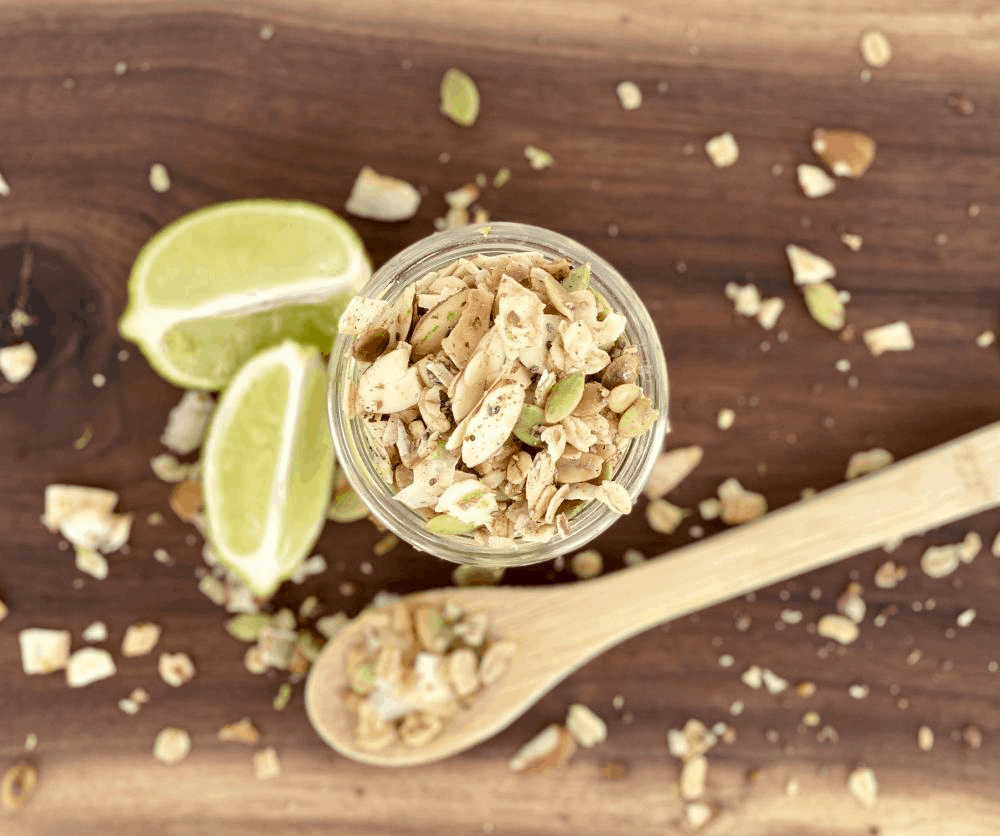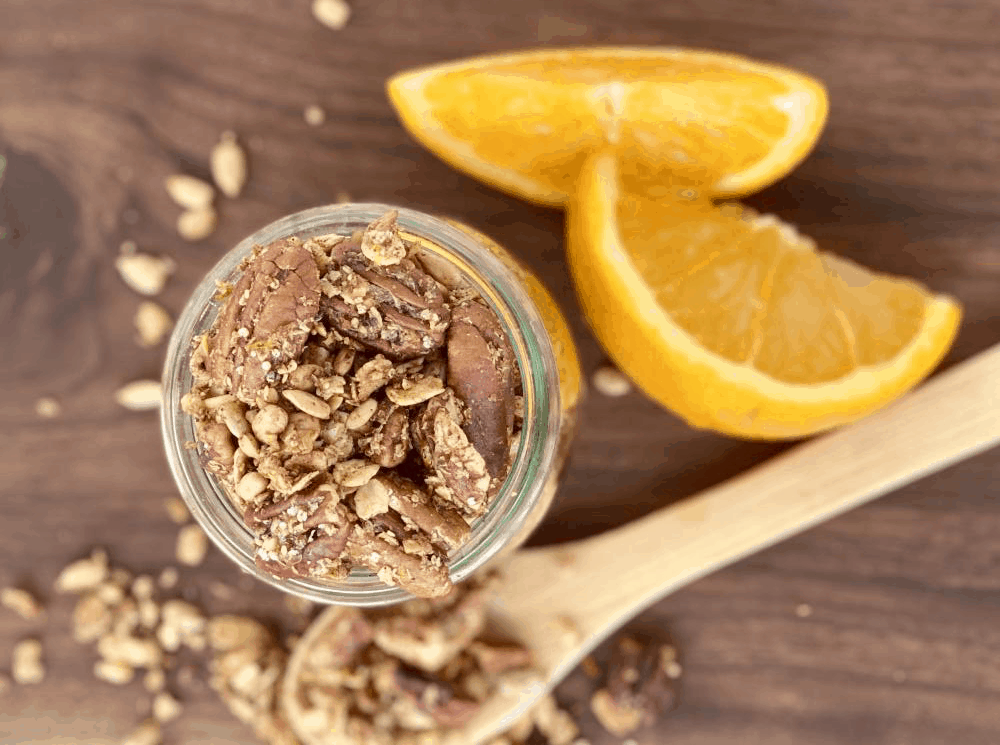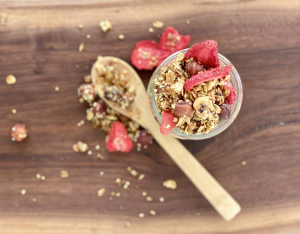
Therapeutic Foods to Energize You!
Let your diet fuel you up to stay energized all day long!
Life can be hectic with kids back in school, or at least back to on-line school in 2020. All the activities that come with school or getting back into a regular routine can feel overwhelming and fatigue and tiredness too often set in. It is important to check-in with your diet to make sure it is supplying you with sufficient energy and nutrients instead of contributing to fatigue or making you feel drained and exhausted.
Do you need support managing your fatigue or stress? If you are unsure how to get started, MaxWell Clinic™ can offer the guidance you need for optimizing your energy and health!
Through Fatigue Fighting Nutrition Support and testing, such as Firstbeat’s Heart Rate Variability Analysis, we can help you manage stress and enhance recovery.
FIRSTBEAT Anaylsis Available at MaxWell Clinic
Knowledge gained from Firstbeat’s unique assessment can help you recognize signs of burnout and avoid periods of exhaustion. Become more energized through discovering your sleep patterns, avoiding prolonged stress, and exploring the effects of physical activity.
There’s no shortage of stress in the world, especially right now. This year’s events have everyone feeling uncertain about the future.
But you know what won’t help anyone? Being stressed. Remember, you have a duty to take care of yourself, and that means managing your own stress.
AdreCalm™ is designed to help you remain at peace in the face of whatever opportunities the day holds.
And if you lose your cool anyway? We’ve got you covered. AdreCalm™ is packed to the brim with compounds that help you return to a state of balanced calm AFTER a stressful experience.
Now is the perfect time to try it out for yourself!
Along with a healthy balanced diet, consider the additional help of AdreCalm™ to help alleviate occasional fatigue, recover from effects of everyday stress, and support relaxation from a combination of clinically tested herbal ingredients.
Mitochondrial Health
Diet provides nutrients to support mitochondrial health. Inside our cells, mitochondria produce ATP, energy to keep us going. To produce this energy, our body uses many nutrients we receive from food. If our diet is lacking, we may not be producing adequate energy. Take a look at the magnesium, zinc, CoQ10, and B vitamins in your diet. Carbohydrate, fat, and protein are also important for appropriate mitochondrial function. A balanced diet is key to provide sufficient energy stores and keep our body functioning correctly.
Mitochondria run properly on nutrients provided through food. Properly working mitochondria can help reduce fatigue.
Support mitochondrial health through diet:
- Magnesium: almonds, spinach, cashews, black beans, edamame, peanut butter, potatoes, rice, oats, kidney beans, and bananas
- Zinc: oysters, beef, lobster, beans, pumpkin seeds, cashews, chickpeas, oats, and almonds
- CoQ10: beef, chicken, fish, and nuts
Hydration
Even mild dehydration can contribute to fatigue and tiredness. Providing adequate hydration has been shown to decrease fatigue. Set a goal for water intake each day and sip on water consistently all day long.
Gut Health
Removing foods that you may be sensitive to while consuming nutrient-dense, anti-inflammatory, and antioxidant-rich foods may improve gut health and alleviate fatigue. Food intolerances are often seen along with chronic fatigue. An elimination diet trial may be useful to reduce fatigue. Work with a dietitian or medical provider to properly perform an elimination diet.
A poor microbiome may also advance fatigue. Dysbiosis, an imbalance of bacteria in the microbiome, this case in the gut, has been observed in chronic fatigue patients. Lower diversity of the microbiome has also been detected in fatigue patients compared to nonfatigued patients.
Sleep & Weight
Sleep can be altered from a diet high in fat, poor diet quality, and from excessive carbohydrate and sugar intake, which can result in fatigue.
Maintaining a healthy weight is important as obesity has been related to worsened fatigue. Inflammation and sleep disorders that can come with excessive weight are two factors that contribute to fatigue. Both inflammation and sleep are heavily influenced by diet.
Balance your Diet
Better overall diet quality can lower fatigue occurrence. Eat a variety of different colored vegetables and fruits throughout the week to provide adequate nutrients to help prevent fatigue and provide proper nutrients for mitochondrial health.
Studies have shown that a balanced diet may be able to improve symptoms of fatigue, while a poor diet and nutritional deficiencies may both contribute to fatigue. Fatigue is often seen with immune deficient and inflammatory conditions. A pro-inflammatory state is thought to worsen symptoms of fatigue. A well balanced diet plan that also improves inflammation and supports a healthy immune system may help reduce fatigue symptoms.
A high quality diet consisting of fiber, fruits, vegetables, and omega-3 fatty acids has been associated with lower incidence of fatigue.
A balanced diet can look different for everyone. For a general balanced diet to improve tiredness and fatigue:
- Increase fiber
- Include whole grains
- Eat a variety of vegetables and fruits
- Consume adequate omega-3s
- Add adequate protein
To do this, begin by making 1/2 your plate non-starchy veggies, 1/4 of your plate whole grains, and 1/4 of your plate protein. Then, add fruit, nuts, and seeds for the addition of extra fiber and healthy fats.
- Think cruciferous veggies and leafy greens for non-starchy vegetables.
- Try quinoa, wild rice, and oats for whole grains.
- Use beans, fish, and unprocessed lean meats for protein.
Add a little dark chocolate to your balanced diet! One small study showed a significant decrease in fatigue with the consumption of polyphenol rich cocoa liquor.
Consider adding other polyphenol rich foods to your diet:
- Spice it up with cloves
- Ground up some flaxseed
- Sprinkle on hazelnuts and pecans
- Snack on berries
- Toss in black and green olives
Design your own Granola
Snacks should be like mini meals. They should be balanced just like breakfast, lunch, and supper. Look to add protein, carbohydrate, fat, and fiber each time you grab a snack. Create a balanced option by designing your own granola. Sprinkle it on top of probiotic rich yogurt, on a smoothie bowl, or just eat it with a spoon to help keep your energy level steady all day.
Design your own granola or try one of my Citrus Series Granolas for quick and easy granola recipes that bake in just 10 minutes! These are super easy to make, which can be important if you are feeling tired or run down. Just pour all ingredients into one bowl, stir, bake, and done!
Ingredients:
1/2 cup nuts
1/2 cup grains
1/2 cup seeds
2 T extra fiber such as chia seeds, ground flax seed, or psyllium husks
1 T healthy fat
1 T sweetener of choice
1 tsp spice
1/2 cup freeze-dried or dried fruit
Directions:
Stir all ingredients, except fruit, together in a large bowl. Pour and spread out granola mixture on lined baking sheet. Bake at 350 degrees for 10 minutes, stirring once halfway through. Remove from oven, allow to cool, and stir in fruit.
For my Citrus Series Granola, I have followed the above basic recipe with a few additions for an extra punch of citrusy flavor and spice!
Lime Cardamom
1/2 cup sliced almonds
1/2 cup oats
1/2 cup pumpkin seeds
1 T chia seeds
1 T ground flax seed
1 T coconut oil, melted
1 T maple syrup
1/2 cup unsweetened coconut flakes
Zest from 1 lime
1 tsp cardamom
Directions:
Stir all ingredients together in a large bowl. Pour and spread out granola mixture on lined baking sheet. Bake at 350 degrees for 10 minutes, stirring once halfway through.
Cinnamon Orange
1/2 cup quinoa flakes
1/2 cup sunflower seeds
1 T psyllium husk
1 T ground flax seeds
1 T avocado oil
1 T maple syrup
Zest from one orange
1 tsp vanilla
1 tsp cinnamon
1/4 tsp cloves
Directions:
Stir all ingredients together in a large bowl. Pour and spread out granola mixture on lined baking sheet. Bake at 350 degrees for 10 minutes, stirring once halfway through.
Strawberry Lemon
1/2 cup hazelnuts
1/2 cup oats
1/2 cup hemp hearts
2 T chia seeds
1 T coconut oil
1 T honey
Zest from 1 lemon
1 cup freeze-dried strawberries
Directions:
Stir all ingredients, except strawberries, together in a large bowl. Pour and spread out granola mixture on lined baking sheet. Bake at 350 degrees for 10 minutes, stirring once halfway through. Remove from oven, allow to cool, and stir in freeze-dried strawberries.
We checked a lot of boxes to improve energy with the Citrus Series Granola recipes. We added fiber, whole grains, omega-3s, and fruit to the diet. But you know I have to sneak in veggies any chance I get! So here it is, Sweet Potato Granola and it is delicious! Back to school means it is almost fall, my favorite time of year! I am pushing the fall flavors a little early. But why only enjoy fall’s flavors (the best flavors!) a few months out of the year?
Sweet Potato Fallnola
Ingredients:
1/2 cup sweet potato, baked and pureed
or 1/2 cup canned organic sweet potato puree
1 cups oats
1 cup pumpkin seeds
1 cup pecans
2 T ground flax seeds
1/2 tsp cinnamon
1/4 tsp cloves
1/4 tsp nutmeg
1 T coconut oil
1 T maple syrup
1 cup freeze-dried apples
Directions:
Stir all ingredients, except apples, together in a large bowl. Pour and spread out granola mixture on lined baking sheet. Bake at 350 degrees for 15-20 minutes, stirring once halfway through. Remove from oven when golden brown and crisp, allow to cool, and stir in freeze-dried apples.
August Grocery Recommendation:
Ancient Harvest’s Quinoa Flakes
Quinoa flakes can be eaten raw or cooked. Try them in granola, as a hot cereal, as overnight quinoa porridge, mixed into turkey meatloaf, or added to a bean or veggie burger.
This month, I invite you to a new nutrition challenge!
FEEDING MAXWELL CHALLENGE:
Check-in with the overall quality of your diet. Keep a 7-day food journal and see what you learn!
References:
Azzolino, D., Arosio, B., Marzetti, E., Calvani, R., & Cesari, M. (2020). Nutritional Status as a Mediator of Fatigue and Its Underlying Mechanisms in Older People. Nutrients, 12(2), 444. https://doi.org/10.3390/
Campagnolo, N., Johnston, S., Collatz, A., Staines, D., & Marshall-Gradisnik, S. (2017). Dietary and nutrition interventions for the therapeutic treatment of chronic fatigue syndrome/myalgic encephalomyelitis: a systematic review. Journal of human nutrition and dietetics : the official journal of the British Dietetic Association, 30(3), 247–259. https://doi.org/10.1111/jhn.
Filler, K., Lyon, D., Bennett, J., McCain, N., Elswick, R., Lukkahatai, N., & Saligan, L. N. (2014). Association of Mitochondrial Dysfunction and Fatigue: A Review of the Literature. BBA clinical, 1, 12–23. https://doi.org/10.1016/j.
González-Mercado, V. J., Pérez-Santiago, J., Lyon, D., Dilán-Pantojas, I., Henderson, W., McMillan, S., Groer, M., Kane, B., Marrero, S., Pedro, E., & Saligan, L. N. (2020). The Role of Gut Microbiome Perturbation in Fatigue Induced by Repeated Stress from Chemoradiotherapy: A Proof of Concept Study. Advances in medicine, 2020, 6375876. https://doi.org/10.1155/2020/
Haß, U., Herpich, C., & Norman, K. (2019). Anti-Inflammatory Diets and Fatigue. Nutrients, 11(10), 2315. https://doi.org/10.3390/
Liska, D., Mah, E., Brisbois, T., Barrios, P. L., Baker, L. B., & Spriet, L. L. (2019). Narrative Review of Hydration and Selected Health Outcomes in the General Population. Nutrients, 11(1), 70. https://doi.org/10.3390/
Mattila, P. & Kumpulainen, J. (2001). Coenzymes Q9 and Q10: Contents in Foods and Dietary Intake. Journal of Food Composition and Analysis. 14. 409-417. 10.1006/jfca.2000.0983.
National Institutes of Health. (2020, March 24). Magnesium. https://ods.od.nih.gov/
National Institutes of Health. (2020, July 15). Zinc. https://ods.od.nih.gov/
Newberry, F., Hsieh, S. Y., Wileman, T., & Carding, S. R. (2018). Does the microbiome and virome contribute to myalgic encephalomyelitis/chronic fatigue syndrome?. Clinical science (London, England : 1979), 132(5), 523–542. https://doi.org/10.1042/
Nisar, M., Mohammad, R. M., Arshad, A., Hashmi, I., Yousuf, S. M., & Baig, S. (2019). Influence of Dietary Intake on Sleeping Patterns of Medical Students. Cureus, 11(2), e4106. https://doi.org/10.7759/
Pérez-Jiménez, J., Neveu, V., Vos, F., & Scalbert, A. (2010). Identification of the 100 richest dietary sources of polyphenols: an application of the Phenol-Explorer database. European journal of clinical nutrition, 64 Suppl 3, S112–S120. https://doi.org/10.1038/ejcn.
Popkin, B. M., D’Anci, K. E., & Rosenberg, I. H. (2010). Water, hydration, and health. Nutrition reviews, 68(8), 439–458. https://doi.org/10.1111/j.
Pravst, I., Zmitek, K., & Zmitek, J. (2010). Coenzyme Q10 contents in foods and fortification strategies. Critical reviews in food science and nutrition, 50(4), 269–280. https://doi.org/10.1080/
Sathyapalan, T., Beckett, S., Rigby, A. S., Mellor, D. D., & Atkin, S. L. (2010). High cocoa polyphenol rich chocolate may reduce the burden of the symptoms in chronic fatigue syndrome. Nutrition journal, 9, 55. https://doi.org/10.1186/1475-
Stern, J. H., Grant, A. S., Thomson, C. A., Tinker, L., Hale, L., Brennan, K. M., Woods, N. F., & Chen, Z. (2014). Short sleep duration is associated with decreased serum leptin, increased energy intake and decreased diet quality in postmenopausal women. Obesity (Silver Spring, Md.), 22(5), E55–E61. https://doi.org/10.1002/oby.
Tardy, A. L., Pouteau, E., Marquez, D., Yilmaz, C., & Scholey, A. (2020). Vitamins and Minerals for Energy, Fatigue and Cognition: A Narrative Review of the Biochemical and Clinical Evidence. Nutrients, 12(1), 228. https://doi.org/10.3390/
Weber, C., Bysted, A., & Hølmer, G. (1997). Coenzyme Q10 in the diet–daily intake and relative bioavailability. Molecular aspects of medicine, 18 Suppl, S251–S254. https://doi.org/10.1016/s0098-
Zick, S. M., Colacino, J., Cornellier, M., Khabir, T., Surnow, K., & Djuric, Z. (2017). Fatigue reduction diet in breast cancer survivors: a pilot randomized clinical trial. Breast cancer research and treatment, 161(2), 299–310. https://doi.org/10.1007/
Feeding MaxWell nutrition emails are produced for informational purposes only and brought to you by MaxWell Clinic, LLC. The information is provided by a Registered Dietitian Nutritionist that has been trained in providing dietary advice backed by nutritional science and research. The nutrition information is not to be construed as medical advice or medical nutrition therapy. The information is not to be used as individualized nutrition counseling or used to diagnose, cure, treat, or prevent any medical problems. The content of these emails should not be used as a substitute for medical treatment from your medical provider. Any information, examples, recipes, foods, or stories presented do not constitute a warranty, guarantee, or prediction regarding the outcome of the individual using the material. The reader is responsible for working with a qualified professional before beginning any new dietary program or plan. The writers and publishers of this nutrition information are not responsible for any adverse reactions, effect, or consequences resulting from the use of provided information, recipes, foods, or suggestions.




